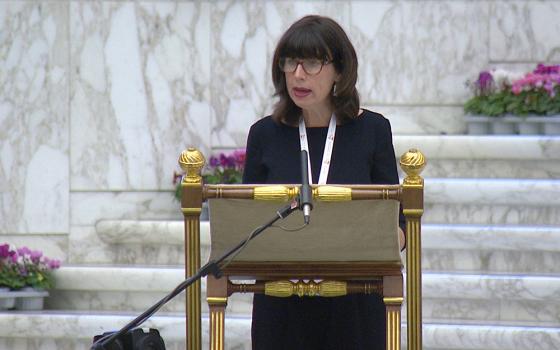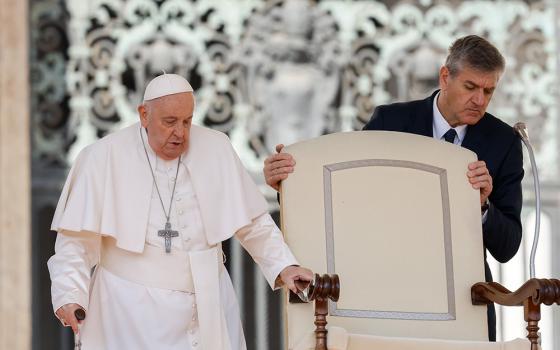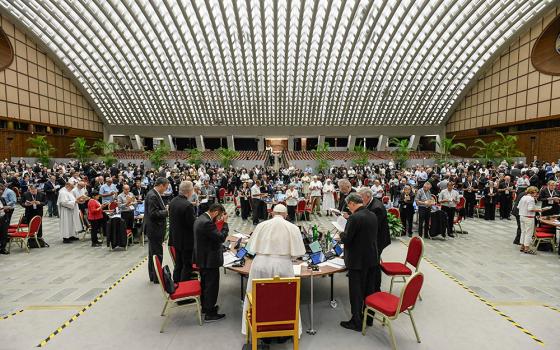The congregation looks on during the procession of Mass in St. Mary of the Assumption Cathedral in Trenton, N.J., Oct. 17, 2021, as Trenton Bishop David M. O'Connell officially began the local process for his diocese's participation in preparations for the 2023 meeting of the world Synod of Bishops on synodality. (CNS/The Monitor/Hal Brown)
More than a half million U.S. Catholics have participated in synodal listening sessions over the past year as part of Pope Francis' two-year process of grassroots listening ahead of the 2023 Synod of Bishops in Rome, and responses indicate that many Americans want a more welcoming church that reaches out to the marginalized, especially the LGBTQ community, and that allows women to serve in leadership positions, including ordained ministry.
A review of more than a dozen synodal "synthesis" reports, posted online by dioceses across the country, also indicates that most Catholics are tired of the polarization in the church; believe that clerics need to do a better job communicating and involving the laity in ecclesial governance; and appreciate the opportunity to be heard, even if they harbor misgivings about what the Synod on Synodality will ultimately accomplish.
"I've been really touched by the amount of honesty that I've seen. Sensitive things are coming up, difficult conversations about difficult topics are coming up," said Julie McStravog, a consultant helping to coordinate the U.S. Conference of Catholic Bishops' synodal work.
McStravog told NCR that since fall 2021, more than 650,000 Catholics in the United States participated in synodal listening sessions, either online or in person, or responded to written surveys. In all, she said Catholics had more than 30,000 opportunities to participate in the synod.
"I'm delighted to see that every single report I've read expresses an appreciation for and a desire to continue the synodal listening, to enter into a sacred space and engage in deep listening and discernment with one another on a regular basis," McStravog said.
Still, the estimated 650,000 synod participants represent a little more than 1% of the roughly 51 million Catholic adults in the United States. The diocesan reports indicate that about two-thirds of those who attended listening sessions were 55 or older, and that most of those participants were women. An overwhelming majority of synodal participants were also white — 94% in the Diocese of Worcester, Massachusetts, for example — and were more likely to be married and attend Mass weekly.
Massimo Faggioli, a theologian and church historian at Villanova University who has written about the synod, told NCR that he was not surprised that participation occurred mostly among older white Catholics who are already involved in the church. He said parish and diocesan outreach in many locations appeared to be geared toward that familiar demographic.
"For the synod, parishes had to be prepared for some kind of a controlled chaos, for the unexpected or a disruption, but I haven't seen much of this openness in the U.S church to taking risks," Faggioli said.
Several diocesan reports touched on the difficulty of engaging voices not often heard in church settings, especially younger generations of Catholics. In most dioceses, synod participants expressed concerns about the church not connecting with youth and young adults.
"The youth were recognized many times over as a focal point of concern. We need to take greater care for them, build up our catechetics, formation, service opportunities, and social programming for them," the Diocese of Salt Lake City noted in its synodal report.
In the Diocese of San Jose, California, the synodal synthesis report said the Catholic Church needs a better understanding of young people's concerns. Synod participants there "expressed a desire for more effective faith formation and activities that make youth feel like members of the Catholic family."
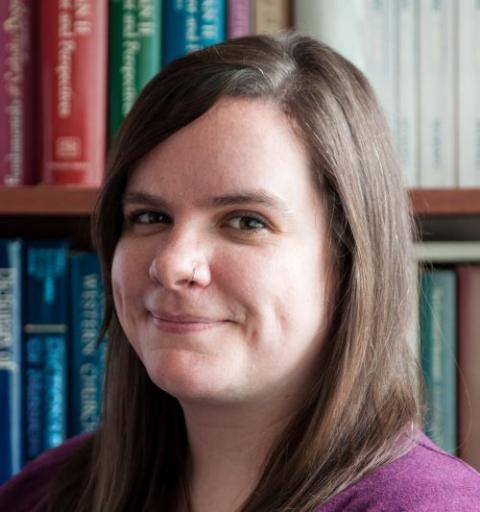
Julia McStravog, a former U.S. Conference of Catholic Bishops employee, is a consultant to the bishops on the on the two-year discernment process underway to prepare for the Synod of Bishops in October 2023. (CNS/Jessica S. Zurcher)
As of Aug. 5, the U.S. bishops had received synodal reports from 172 of the 178 Latin Rite dioceses in the United States. McStravog said 75% of those dioceses have indicated that they plan to make the reports publicly available, while others are "still discerning" if they will do so.
"About three quarters of the dioceses that have submitted their reports say they're going to use those documents for other purposes like pastoral planning, to really continue bringing the synod into the activities and structures of their local churches," McStravog said.
McStravog said the bishops' conference's synod team planned a "writing retreat" in early August to begin synthesizing — into a single 10-page document — the themes from nearly 300 reports submitted by dioceses, religious orders, Catholic universities, ministries and other groups. Those reports have already been combined into 15 "regional reports" that the conference's writing team has been reading over the last few weeks.
The deadline for national episcopal conferences to submit their reports to the Vatican's General Secretariat of the Synod of Bishops was Aug. 15.
Described by some observers as "the biggest consultation exercise in human history," the 2021-23 Synod of Bishops' two-year process of global listening and dialogue is set to culminate in an October 2023 gathering of bishops and synod delegates in Rome. Pope Francis and other church leaders have framed synodality as a decisive step in the church's renewal that the Second Vatican Council proposed more than a half century ago.
Pope Francis speaks as Maltese Cardinal Mario Grech, secretary-general of the Synod of Bishops, looks on during a meeting with representatives of bishops' conferences from around the world at the Vatican in this Oct. 9, 2021, file photo. Cardinal Grech and Cardinal Kurt Koch, president of the Pontifical Council for Promoting Christian Unity, released a joint prayer that calls for the Catholic church to "walk together with all Christians" during the synod process. (CNS/Paul Haring)
"The benefits of the synodal process itself will animate future applications of this synodal approach in unseen ways," said Richard Coll, executive director of the U.S. bishops' Department of Justice, Peace and Human Development.
Coll, who served as the bishops' liaison to diocesan synod coordinators, told NCR that the hundreds of synod reports from dioceses and other groups reflect a common theme of welcoming and reaching out to communities estranged from the Catholic Church in the United States.
"That seems to be a very important theme coming from these reports, as was anticipated by the Synod Secretariat and Pope Francis himself. That's been a beautiful part of the process in my experience," Coll said.
Welcoming was a common thread that ran through the dozen synod reports that NCR reviewed from dioceses in the Northeast, West, South and Midwest. Catholics who participated in the synod said that the church, from the parish to the diocesan level, has to do better at making people feel welcome in the pews and other church settings. They said that immigrants, people of color, youth and young adults, divorced and remarried Catholics, and other marginalized groups often do not feel welcome at church.
'For the synod, parishes had to be prepared for some kind of a controlled chaos, for the unexpected or a disruption, but I haven't seen much of this openness in the U.S church to taking risks.'
—Massimo Faggioli
Synod participants across the country often highlighted the LGBTQ community, which they said is particularly sidelined by many in the church. Francis DeBernardo, the executive director of New Ways Ministry, a Maryland-based nonprofit that advocates for LGBTQ Catholics, said he was not surprised that it was a top issue.
"I think what church leaders have not recognized about LGBTQ issues is that they do affect almost everyone in the church beyond LGBTQ people because almost everyone has a family member or knows an LGBTQ person, either as a co-worker, a neighbor or friend, but often as a family member, and they see the terribly shabby way that they often get treated in church and church settings," DeBernardo told NCR.
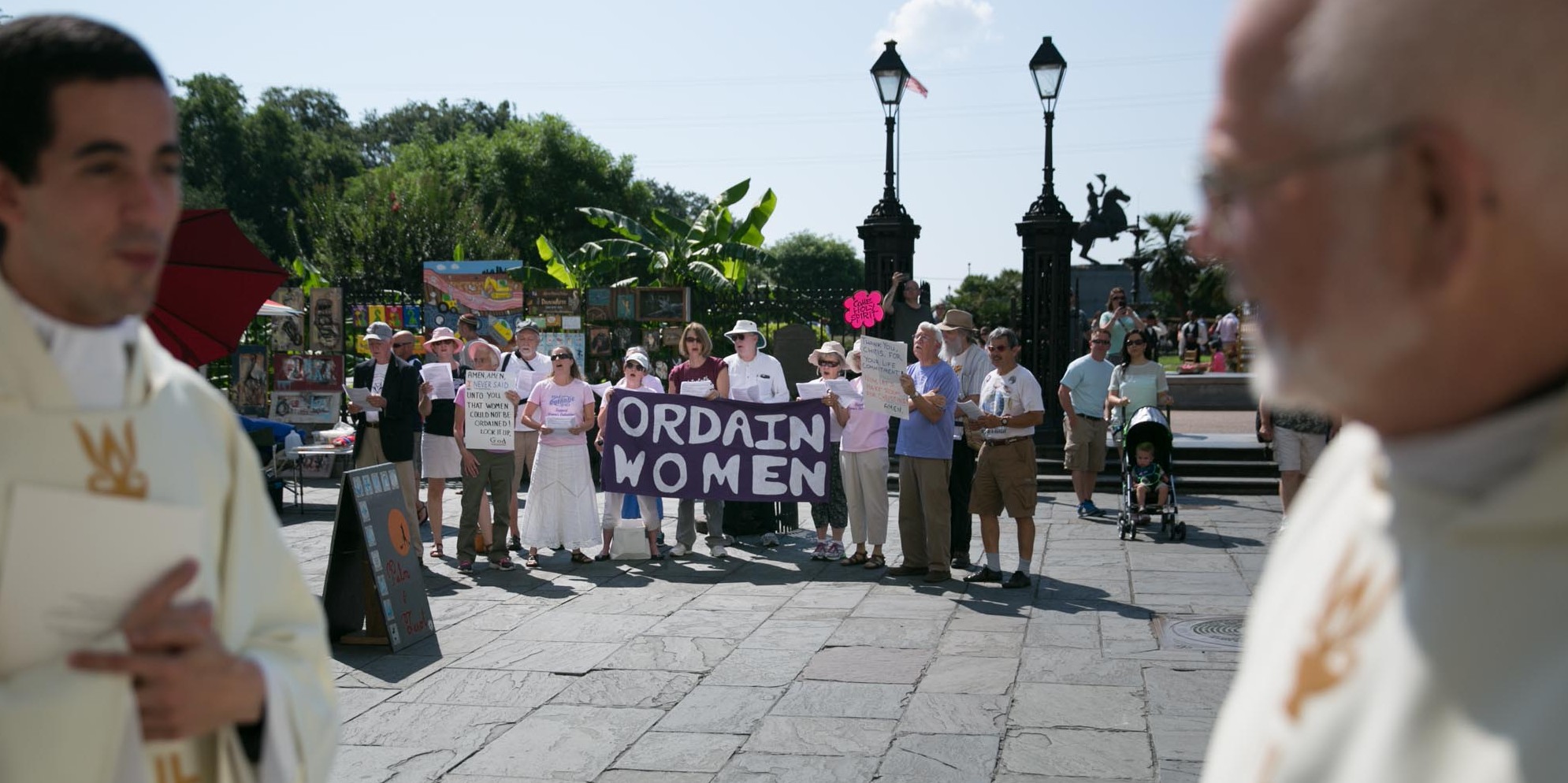
Supporters of women's ordination gather in Jackson Square in New Orleans outside the St. Louis Cathedral during the archdiocese's ordination ceremony for new priests in June 2015. Many participants in the synodal listening sessions in U.S. dioceses cited support for women's ordination and more leadership roles for women in the church. (Gabriela Arp)
The role of women in the Catholic Church was another common concern. Participants said that women deserve to be in important leadership positions in the church, even in roles that are currently cut off to them via ordained ministry in the permanent diaconate and priesthood. Synod participants framed the issue as a matter of equity and justice.
"It is encouraging to see the sense of the faithful that encourages women's ordination, something we know to be true, to be reflected in these official documents," said Kate McElwee, executive director of the Women's Ordination Conference, an organization that advocates for women to be ordained deacons, priests and bishops in the Catholic Church.
McElwee told NCR that she found it "very powerful" to see the grassroots call for women's ordination reflected in synod reports, adding that to "see their voices and longing reflected in them is a positive sign."
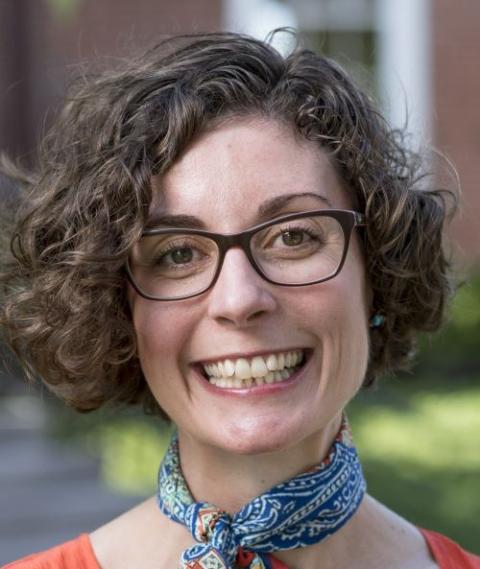
Katie Ann-Marie Bugyis is a theology professor at the University of Notre Dame who studies the history of women's roles in the Catholic Church. (Courtesy of Katie Ann-Marie Bugyis)
Katie Ann-Marie Bugyis, a theology professor at the University of Notre Dame who studies the history of women's roles in the Catholic Church, told NCR that she was not surprised with the synodal responses calling for women to have equal positions of leadership and authority in the church.
"Women have had really prominent ministerial roles in the church, and this has been true since the beginning of the church's history, and I think it still remains true today," said Bugyis, who noted historical research showing that women served as deacons in the early church.
"There are many women who are really thinking about their place in society and the ways in which many patriarchal forces are still at work that are keeping them from making certain advances, and that includes the church," Bugyis said.
Synod participants across the board also called for better adult faith formation opportunities as well as vibrant liturgies and engaging homilies; better communication from priests and bishops; more efforts to integrate the different linguistic communities in multiethnic parishes and a sense of shared leadership between the clergy and laity. They also called for bishops and priests to address the widening polarization in the church, though they often disagreed on what constituted improper political commentary.
"There is an awareness of the difficult talks and the difficult conversations, and I think that is coming through to the top," said McStravog, who noted that many participants were somewhat skeptical about the synod even as they appreciated the opportunity to share their thoughts in listening sessions.
Advertisement
"There's excitement but also skepticism, though that skepticism may be less now than when we first started on this synodal journey," McStravog said.
Several dioceses indicated in their synthesis reports that they have already started to address some of the themes that emerged in local listening sessions, where participants also often said they want synodality to continue in their parishes.
"One of the things that I think is really important to remember is that the synod happens in the local church," McStravog said. "The diocese is where you're going to see the change first. It's not going to be at the USCCB level or the Vatican level, but in those diocesan reports is where you are going to see it first."





